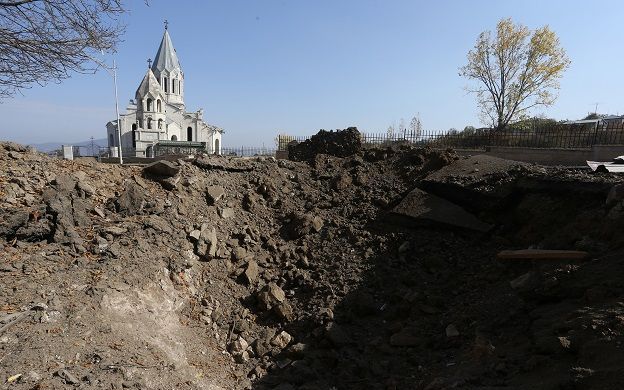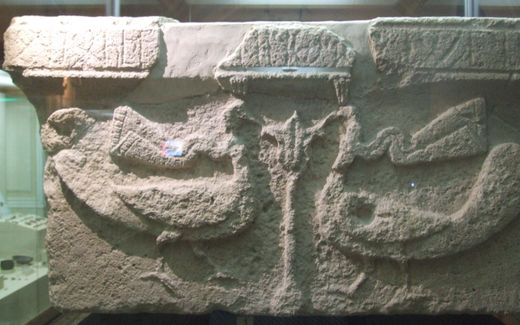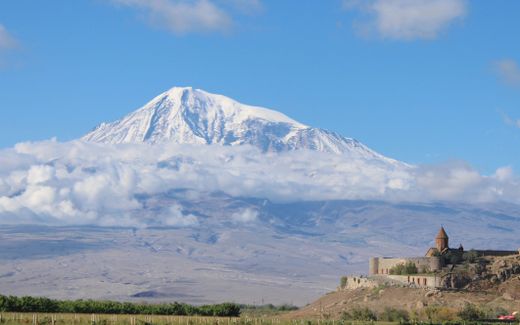Worries about plans for destruction Christian heritage in Armenia

Church in the town of Sushi. Photo EPA, Hayk Baghdasaryan
Eastern Europe
Azerbaijan recently announced that “Armenian forgeries” will be removed from churches in Nagorno-Karabakh. The message has raised alarm bells in Armenia.
Azerbaijan considers destroying the Christian heritage in the region in the long term, Kathpress reports. Churches urgently request the West to take action.
During a conflict with Azerbaijan last autumn, Armenia lost control over a large part of Nagorno-Karabakh. Therefore, many important Christian sites, such as Sushi Cathedral and the Dadivank Monastery, are no longer under Armenian control.
The Azerbaijani Minister of Culture, Anar Karimov, announced on February 3 that he established a working group to remove “fictitious traces of Armenians on Albanian religious sites.” According to Karimov, the working group has to examine the site and discuss further steps.
The “fictitious Armenian traces” refer to a theory that the Christian heritage in the region is the legacy of Caucasian Albania. This ancient kingdom existed in Azerbaijan until the early 9th century. The Armenian inscriptions found in the churches today would then result from the “Armenisation” in the wake of the early 19th century. During that period, many Armenians immigrated to the region. If the theory were correct, the churches would be of Azerbaijani heritage. Most historians reject the theory, but nationalist Azerbaijani historians and the country’s government still propagate it.
For example, the Azerbaijani president stated during a visit to the region in 2021 that Armenians wanted to armenise the churches with inscriptions. “All these inscriptions are fake; they were put up later.” And in May 2021, Azerbaijani authorities began renovating the 19th-century Sushi Cathedral, which was damaged during the war. The goal was to restore it in “its original form.”
International community
The Armenian Apostolic Church condemns the actions as “anti-human and anti-civilisation” and calls the international community to act against this “open fact of cultural genocide.” According to the Church, the Armenian identity of the churches has been scientifically proven.
Also, the head of the Armenian Apostolic Church appeals to the international community for the protection of the Christian heritage in the region. He refers to the Azerbaijani enclave of Nakhichevan, where the authorities demolished thousands of historical Christian sites. “Because the world looks the other way, Azerbaijan believes it can carry out such actions again.”
Armenia expert Jasmin Dum-Tragut from Salzburg added earlier in an interview with Kathpress that Azerbaijan rewrites history. “Armenian Christians become Caucasian Albanians, and Azerbaijani schoolbooks provide incorrect or no information about Christians in Azerbaijan. In some cases, Armenia is referred to as West-Azerbaijan.”
Centuries of Christian history
Nevertheless, the issue has not caused global upheaval. Only a few voices speak out against Azerbaijan. In December 2021, the International Criminal Court ruled that Azerbaijan must take “all necessary measures to prevent and punish vandalism and desecration of Armenian cultural sites.”
The U.S. international Religious Freedom Commission tweeted that it was “deeply concerned” about the Azerbaijani plans.
UNESCO has attempted to send a delegation to the region of Nagorno-Karabakh to inspect cultural sites but has not yet been successful.
Nagorno-Karabakh has been part of Armenia since 200 B.C. The region was Christianised in the 4th century. As early as the mid-5th century, an independent Catholicosate was founded in Karabakh. It was the oldest independent Armenian church until the 19th century.
Related Articles





